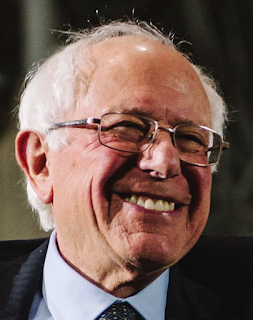CNN host:
Pete Buttigieg criticized Joe Biden for Hunter being on the Ukraine board. What do you have to say about it?
Pete Buttigieg criticized Joe Biden for Hunter being on the Ukraine board. What do you have to say about it?
Andrew Yang:
 "I think Democrats ought to be focused on the problems that got Donald Trump elected in the first place, the fact that we are going through the most profound economic transformation of our time. We need to provide a new positive vision for America."
"I think Democrats ought to be focused on the problems that got Donald Trump elected in the first place, the fact that we are going through the most profound economic transformation of our time. We need to provide a new positive vision for America."
Good answer.
1. The CNN host wanted a newsworthy squabble. The Hunter Biden problem is real, even if Joe Biden and Democrats try to dismiss it, because it undermines the Democratic Trump-is-corrupt-and-in-the-swamp argument. Burisma hiring Hunter Biden was archetypal swamp behavior. Pete Buttigieg commented on it.
Yang did not bite. He focused back on solving actual problems important to Americans.
2. No enemies. Yang is unique among the candidates for president in his focus on impersonal, third party forces, not identity or morality or ideological enemies. He says the problem with America's economy isn't the ruling class predation described by Sanders nor the corruption described by Warren. It is the impersonal forces shaping the modern economy. Technological change and the global economy created the squeeze on the young and poor and working Americans who are angry, and for good reason. Income doesn't trickle down, the young are buried in debt, houses cost too much in areas where the jobs are. The problems that created left and right populist revolts are real.
He doesn't criticize corporations for being immoral. They do what is in their nature and incentive to do: avoid taxes while they push to be bigger and more profitable, and do so by buying influence with legislators. More important, Yang does not sound like he is fighting with anyone. He is not at war with whites, or Christians, or even Trump. He has a populist solution, without creating populist enemies.The problems are real, and people's anger is justified, but it isn't solved by fighting the culture war. The problem is progress and technology and it snuck up on us. We can fix it with something that people would actually like.
He doesn't criticize corporations for being immoral. They do what is in their nature and incentive to do: avoid taxes while they push to be bigger and more profitable, and do so by buying influence with legislators. More important, Yang does not sound like he is fighting with anyone. He is not at war with whites, or Christians, or even Trump. He has a populist solution, without creating populist enemies.The problems are real, and people's anger is justified, but it isn't solved by fighting the culture war. The problem is progress and technology and it snuck up on us. We can fix it with something that people would actually like.
As Yang presents it, a Universal Basic Income is not a new idea, nor a left wing idea, and it is not theft or a giveaway. Nixon had considered it. Conservative economists has suggested it: spread the wealth. It can be done by monetizing the value that each American creates by offering up his extraordinarily valuable data to technology companies who use it and sell it and currently pay little in taxes. Yang would tax those corporations, and re-distribute the money to the people who created the value. That is how we pay for the UBI.
Yang's UBI runs into the American--and especially Republican--value of self reliance and the resentment that "other people"-- blacks or immigrants or lazy people or other unworthy--might freeload on the hard work of people like themselves, who actually deserve the government benefits they get. Yang's presents it not as a benefit for the poor but as a unifying alternative to class consciousness. Everyone gets it, for being an American, and poor people will spend it. Everyone will benefit
Could Yang actually win the nomination?
Probably not.
He is a fresh face and the Democrats want one. He looked good, smart, and practical. He presents as a modern manager: suit but no tie, a uniform of technology and millennials at work, not old fashioned Wall Street. Democrats have liked technocratic managers in the past. Dukakis ran as one. Bloomberg is doing it now, too.
Yang can appear to be solving the problems that Sanders and Warren address, without defining it as a divisive war against enemies.
But Yang's biography hinders him. He has not been a successful executive of something important, like a state. Credible allies in academia and business, plus Republicans saying the idea is a good one, could change all that, but it has not happened yet..
But Yang's biography hinders him. He has not been a successful executive of something important, like a state. Credible allies in academia and business, plus Republicans saying the idea is a good one, could change all that, but it has not happened yet..
Yang demonstrates one way for a Democrat to break through a partisan divide between Trump's white Christian ethno-nationalist populism and Democratic identity politics resistance to Trump: solve the problems that have created the populist revolt.
His message is optimistic. The American problem is fixable, a message of hope and change.
That message has a track record of success.
That message has a track record of success.





















